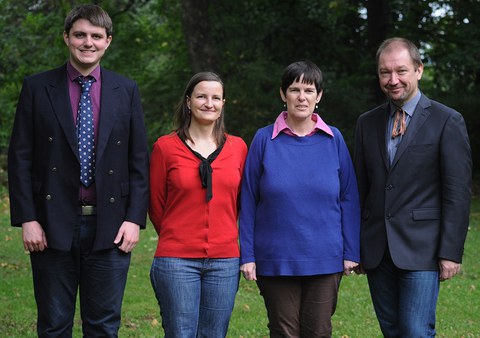Das Graduiertenkolleg
Graduiertenkolleg zum interreligiösen Vergleich monastischer Kulturen
The Project
The creation by certain cultures and religions of ways of life dedicated to the perfection of the self and the seclusion from the world by joining the organisational structures of a monastic community is an acknowledged phenomenon based on anthropological factors. The monastic form of life could and can still be found in Latin as well as Orthodox, Coptic, Ethiopian, Armenian and Syriac Christianity and also in Indian Hinduism and Jainism as well as in different forms of Buddhism. It is international and originated on three continents: Europe, Africa, and Asia. An interreligious and comparative analysis of monastic life is to address the question of why it could flourish and survive with equal success in very different civilisations, religions, and societies. An answer to this question would have dual significance: Based on the current state of research it will allow an understanding of the core meaning of monasticism across the religious divide. It will also reveal monastic culture as a decisive component in human history.
Investigatory Aims
Irrespective of region and culture the history of monasticism tends to represent a very complex structure, which emerges from contiguous and dynamic processes, revealing phases of cataclysm or change as well as strength and continuity.
Nevertheless it is remarkable that this world of diversity and change consisted of ‘assembly kits’, each of them composed of a few extremely effective basic elements. Most important among them are: the creation of a community, a high degree of rationality in organisation, structured rules, obedience as a requirement, integration of the self in the process of raising the individual soul to perfection, asceticism and rejection of the world as well as a strict separation of the interior from the external, with a clear indication of belonging. These primary elements are the foundations for secondary phenomena, which were generated in some variety but with a range that was also limited – among them the vita contemplativa or vita activa, the ministry, preaching, education, and scholarship or the begging of alms.
When we assess the criteria for the choice of the ‘assembly kit’ best suited as a subject for research, we have to make the preliminary concession that each form of monastic life could be subdivided for heuristic purposes into a spiritual and into an organisational part, even though both elements are closely linked de facto. Analysis of the spiritual dimension requires a higher input due to its integration into the system of the respective religion or theology with all its ideal implications like images of transcendence, concepts of individuality, systems of values and virtues etc. It also requires a profound knowledge beyond the features of mere organisation.
For this reason it is recommended to begin with aspects of organisation and to guide the graduates to achieve a comparative analysis of the suitable ‘building block’ from this area.
Yet this requires a perspective in which the focus can be on these multi-faceted and related structures. This perspective is offered by the central normative texts – primarily monastic rules with their prescriptive and exhortative additions – because they, as a core element of monastic culture, constitute a central and general object of study.
Each type of monasticism is based on such normative texts, codified primordially and often held to be sacred and inviolable although in practice they were amended, developed, changed or combined with other texts. This means that by their nature we are dealing with a very flexible and complex set of texts.
Project Implementation
The graduate programme under the direction of Prof. Dr. Dr. h.c. Gert Melville is set to last four years. Grants will be available for three PhD projects to be undertaken by scholars (recruited internationally) willing to analyse normative texts (mostly rules) from different Christian and non-Christian monastic cultures in interreligious comparison. At the centre of analysis will be forms of monasticism developed in Byzantine, Buddhist, and Hindu worlds of the cloister.
The PhD project will be supervised in the form of a co-tutelle by Prof. Dr. Claudia Rapp, Institut für Byzantinistik und Neogräzistik in conjunction with Prof. Dr. Karin Preisendanz and Prof. Dr. Klaus-Dieter Mathes, Institut für Südasien-, Tibet- und Buddhismuskunde, both at the University of Vienna. They will also be in charge of the completion of the doctoral examination process. Curriculum-oriented supervision shall be carried out by a selection of internationally recognised experts. An additional post-doc grant has been awarded for the coordination of research and technical aspects. The post is financed through the TU Dresden in conjunction with the "Support the Best" programme.

